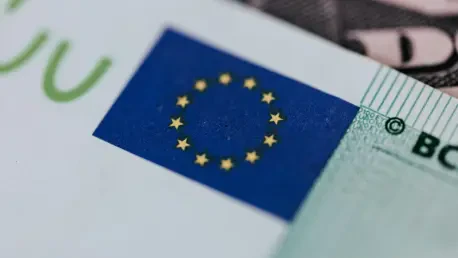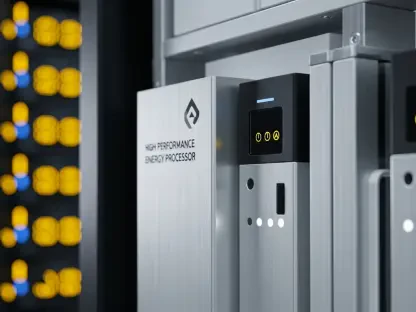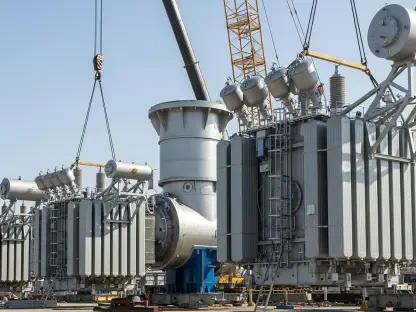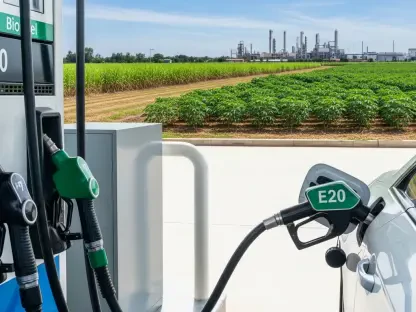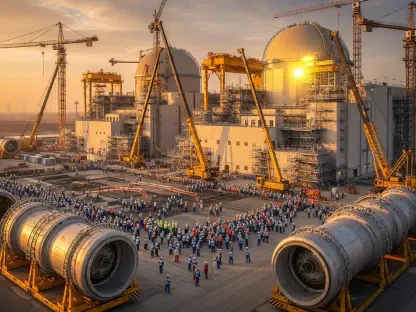Imagine a world where a single gas, invisible yet devastating, accounts for nearly a third of all historical global warming, silently accelerating climate change while nations grapple over trade and energy security. Methane, a potent greenhouse gas, sits at the heart of a heated debate in the European Union (EU), where strict regulations to curb its emissions are under scrutiny. With the EU heavily reliant on imported liquefied natural gas (LNG), particularly from the United States, a clash of environmental priorities and economic needs has emerged. This roundup dives into diverse perspectives from investors, industry stakeholders, and policymakers, exploring why maintaining tough methane rules is a defining issue for climate action and global trade stability. The aim is to unpack varying opinions on how the EU can balance its environmental commitments with geopolitical realities.
Diverse Voices on Methane Rules: A Global Concern
Investor Advocacy for Stringent Standards
A coalition of investors managing over 4.5 trillion euros in assets has emerged as a powerful voice in urging the EU to uphold its rigorous methane emissions laws. These financial giants argue that diluting regulations would inject uncertainty into markets, disrupting long-term investment strategies focused on sustainability. Their stance is rooted in the recognition that methane’s impact on global warming demands unwavering policy consistency to drive meaningful reductions.
Many within this group emphasize that the EU’s current framework, which requires importers of oil and gas to monitor and report supplier emissions, sets a critical precedent for global environmental standards. The fear of regulatory rollbacks is not merely about immediate financial impacts but also about eroding trust in the EU as a leader in climate policy. Such changes could deter future green investments, stalling progress toward net-zero goals.
The investor perspective also highlights a broader concern: weakening rules now could undermine decades of effort to align economic growth with environmental responsibility. Their collective push underscores a belief that strong regulations can coexist with innovation, encouraging industries to adopt advanced emissions-monitoring technologies rather than resist compliance.
U.S. Trade Concerns and Energy Export Priorities
On the other side of the Atlantic, U.S. officials have raised alarms over the potential impact of EU methane regulations on American LNG exports. With the EU now sourcing 57% of its LNG imports from the U.S., a significant jump driven by recent geopolitical shifts, there’s apprehension that stringent rules could hinder trade flows. This viewpoint prioritizes energy security and economic partnerships, framing the regulations as a possible barrier to meeting Europe’s pressing energy demands.
Industry representatives from the U.S. energy sector often argue that the existing first phase of the EU law, while manageable, sets a worrisome tone for future compliance burdens. They point to the upcoming stricter phase, expected by 2027, as a potential flashpoint that could complicate export agreements worth billions annually. The tension here lies in balancing the immediate needs of energy supply with the long-term imperatives of climate mitigation.
Despite these concerns, some trade analysts suggest that fears of disruption might be overstated. Data indicates that the initial reporting requirements, set to begin this year, have not yet impeded U.S. gas shipments to Europe. This raises questions about whether the pushback is more about preempting future challenges than addressing current obstacles, highlighting a need for clearer dialogue between trade partners.
Policy Perspectives on Bridging Environmental and Economic Goals
Policymakers within the EU offer a nuanced take, often positioned between investor demands and trade pressures. Many stress that the methane law is designed not to obstruct energy imports but to ensure accountability across the supply chain. The European Commission has repeatedly expressed confidence that trade will remain unaffected, pointing to the law’s phased implementation as a mechanism to ease industry adaptation.
A key insight from policy circles is the potential for regulations to act as a catalyst for technological advancements in emissions tracking and reduction. Some officials advocate for collaborative frameworks where EU and U.S. entities work together to develop solutions that meet both environmental standards and trade objectives. This approach seeks to reframe the debate from a zero-sum game to a shared opportunity for innovation.
Additionally, there’s a growing call among policy experts for transparent stakeholder engagement to address regional dependencies on imported energy. With the EU committed to substantial annual energy purchases from the U.S., valued at $250 billion, finding a middle ground becomes essential. The challenge lies in crafting policies that uphold climate goals without alienating vital trade partners, a delicate balance that remains under intense scrutiny.
Industry Insights on Compliance and Innovation
Voices from the energy industry provide practical insights into the on-the-ground implications of methane regulations. Many companies acknowledge the importance of curbing emissions but express concern over the costs and complexities of compliance, especially with stricter rules looming in the next two years. There’s a consensus that while the intent behind the law is sound, its execution must account for operational realities across diverse supply chains.
Some industry leaders highlight the opportunity to turn regulatory challenges into competitive advantages by investing in cutting-edge monitoring tools. They argue that firms proactive in adopting such technologies could not only meet EU standards but also position themselves as frontrunners in a rapidly evolving energy market. This perspective shifts the narrative toward viewing regulations as a driver of progress rather than a hindrance.
A contrasting industry opinion focuses on the need for flexibility in implementation timelines to avoid sudden disruptions. Representatives from smaller energy firms, in particular, caution that without adequate support or phased adjustments, the stricter 2027 requirements could disproportionately burden less-resourced players. This viewpoint underscores the importance of tailored policy measures to ensure equitable compliance across the sector.
Reflecting on the Methane Debate: Key Takeaways and Next Steps
Looking back, the discourse surrounding EU methane regulations revealed a complex interplay of priorities, from investor insistence on environmental accountability to U.S. concerns over trade barriers. The investor coalition’s firm stance underscored the critical role of policy stability in sustaining climate-focused investments, while U.S. perspectives highlighted the undeniable importance of energy security in a geopolitically volatile landscape. Policymakers and industry voices further enriched the conversation by advocating for innovation and pragmatic implementation as pathways to reconcile these competing interests.
Moving forward, actionable steps emerged as a focal point for resolution. Policymakers could prioritize establishing regular forums for dialogue between EU and U.S. stakeholders to preempt conflicts over future regulatory phases. Additionally, incentivizing technological advancements in methane monitoring through grants or partnerships could alleviate compliance burdens while advancing climate goals. For those eager to stay engaged, delving into EU energy policy updates or supporting investor-led initiatives offers a tangible way to contribute to shaping a sustainable energy future.
